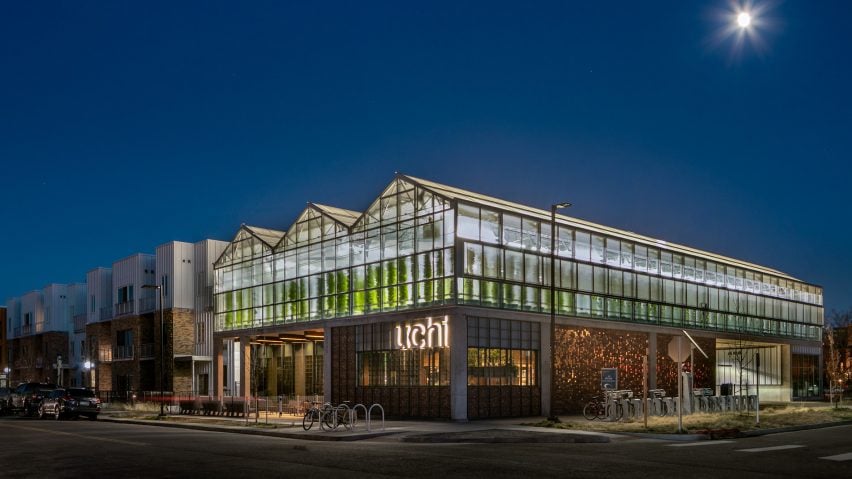US firm Tres Birds Workshop has topped a Japanese restaurant in Denver, Colorado with a greenhouse featuring soil-free growing towers.
The building is located within a block-long, mixed-use development called S*Park, short for Sustainability Park.
Local studio Tres Birds Workshop designed the entire development – which encompasses housing, commercial space and urban farming – near the downtown area of the Colorodo city.
For one corner of the site, the team created a two-story building to house a street-level restaurant and an upper-level greenhouse.
Rectangular in plan, the building consists of a relatively solid base made of brick and concrete. Up above, a fully glazed volume is topped with a multi-gable roof, giving the building a distinctive look.
The ground level was designed for Uchi, an award-winning restaurant that serves up a range of Japanese fare, from wagyu beef and oak-grilled fish to sushi and sashimi. Its first location opened in 2003 in Austin, Texas.
"Uchi creates food with fresh ingredients in ways that defy expectations," said the architects. "The design intent was to support this mission through the programme of the building and the sensory experience of the space."
On the exterior, the restaurant is announced via a large, backlit sign. Visitors step into an L-shaped dining area that is organised around a central sushi counter and bar. The dining area features two rooms with different atmospheres – one is light and warm, while the other makes use of darker tones. Wooden screens help delineate specific zones.
Like other parts of the S*Park development, the architects sought to use common materials in an unexpected way. One of the eatery's most distinctive features is its southern wall, which is composed of reclaimed red bricks and custom-made crystal blocks.
"These crystal bricks transfer light and energy, connecting the comfortable interior to the distant cityscape and the eye of the passerby to the warm light within," the studio said.
The area adjacent to the brick wall features a "chaotic" ceiling installation made of raw wooden planks that were remnants of past projects by Tres Birds Workshop. The timber boards help soften noise and add to the room's sense of enclosure. The darker dining room also has a wooden ceiling installation, although here the slats are arranged in a more orderly fashion.
The dining furniture consists of dark wooden chairs and tables, and booths with tan upholstery. Concrete flooring lends an industrial feel that is countered by the ample use of wood throughout the eatery.
Up above, the team created a 7,000-square-foot (650-square-metre) greenhouse that "supplies the kitchen with the freshest organic greens available throughout the year".
Managed by Altius Farms, the growing area features white, aeroponic towers that require no soil. The plants – which include lettuce, herbs and edible flowers – are regularly misted with nutrient-laden water.
The greenhouse conditions are monitored by sensors that help control heating and cooling and cue the opening of roof and side vents, according to Denver's 303 Magazine. In addition to Uchi, the urban farm provides leafy greens for a number of local restaurants and markets.
With an ever-growing population, Denver has seen a construction boom in recent years. Other projects in the Colorado city include The Source Hotel, which is composed of irregularly stacked volumes, and Zeppelin Station, a large metal-clad building that overlooks train tracks. Both projects were designed by US firm Dynia Architects.
Photography is by James Florio.

